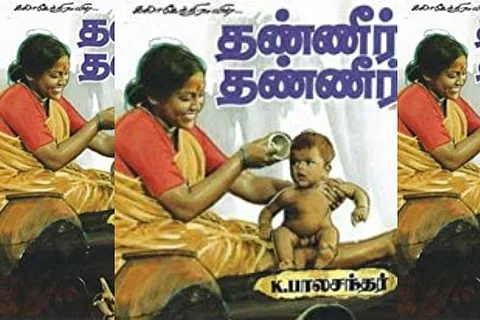Revisiting 'Thanneer Thanneer': How a 1981 Tamil film predicted water scarcity
The severe drought in Chennai this summer suddenly reminded everyone in the city of how precious water is. It reminded people of all the times they’ve been frivolous in its usage. Chennai’s dry waterbeds made it to international headlines while the state government reluctantly stepped into action after having wasted time in denial at first. While drama unfurled on the streets of the city, the story felt very familiar, like history repeating itself.
Almost 40 years ago, in 1981, came Thanneer Thanneer (Water! Water!), a film that tells the story of a parched and barren Tamil Nadu village, Athipatti. Based on Komal Swaminathan’s 1980 play of the same name, the film was directed by K Balachander and went on to win the National Film Award for Best Feature Film in Tamil and National Film Award for Best Screenplay for K Balachander.
If you are reading the title out loud, do so with some urgency and desperation in your voice. This is the feeling that Thanneer Thaneer captures very well during its 2-hour runtime. The film is made more powerful because in reality, Athipatti could be any village, anywhere in the world.
The film presents a dystopian premise which looking back now, appears to have accurately predicted the future like many dystopian works of art have succeeded in doing. There’s not a drop of water in Athipatti, a situation Chennai is familiar with today.
Its very first scene is a long-shot in which we watch with rapt attention as Sevvanthi, brought to life by Saritha, fetches water from a distant pond and carries three pots along with her baby slung across her body, back to her house in Athipatti. This water source is 10 miles away from their village, we’re told.
On her way, she sees a couple of labourers drop their load to drink water from a dirty puddle, they bend on all fours and kiss the puddle, lest they disturb its surface. Sevvanthi is moved. She offers them water from one of her pots. Further down the path, there’s the temple priest. “Why don’t you give one pot of water for the goddess? It’s been long since we gave her a bath,” he asks and then warns, “If we don’t appease her now, how will we ever get rains?” Sevvathi is at first reluctant and she almost walks away but she returns to give him a pot and adds a little prayer for rains. Now on her way, Sevvanthi does not see the priest sneak behind the temple and give the pot filled with water to his wife.
In less than 10 minutes, Thanneer Thanneer
“Cauvery Thenpennai Palaru - thamizh / kandadhor Vaiyai Porunai nadhi - ena / maeviya aauu pala Oda - thiru / maeni sezhitha Thamizh Nadu.”
The lines speak of Tamil Nadu’s fertile lands made rich by rivers like Cauvery, Thenpennai, Palaru, Vaigai, and so on. Taken from Subramaniya Barathi’s poem ‘Senthamizh Naadu’, these lines are used in the closing scene of Thanneer Thanneer.
The irony of its placement isn’t entirely lost on the viewer. But all through its runtime, the film is rich with political symbolism. In one scene, Sevvanthi accuses police officers of apathy, referring to the Kilvenmani massacre of 1968. “When people are burned to death in a village, you do nothing,” she seethes. There’s another character who’s seen wearing the red towel on his shoulders, who speaks of communism and etches a sickle on a tree trunk even while talking to his lover. Towards the end, having lost all hopes, he’s shown turning into a rebel.
All through the film, the priest interjects every time someone plans on bringing water to the village. “Why don’t we sacrifice lambs to the goddess instead? Why don’t we organise a festival to appease her instead?” he suggests. This is especially reflective of present-day politics when religion cuts path with the functions of the state. Just a few months ago, the TN state government requested all temples to hold special rituals for the rains. But unlike now, the people of Thanneer Thanneer, knew better than to indulge in superstition.
The film is also quite vocal in discussing votebank caste politics. The people openly discuss whom to vote for - “Nayakar or Reddiyar? Both have cared less for us, we don’t have a drop of water. Why should we vote?” they talk amongst themselves. Athipatti decides to boycott the elections and gains a bit of recognition for it.
In one of its most important scenes, a man from Athipatti walks into the election booth, against the wishes of the villagers, but only to gulp down three glasses of water. As funny as it looked, the scene makes an important statement. There’s another where a petition signed by the villagers is given to the MLA, who in turn passes it to the collector who in turn passes it to the VAO and so on till it is tucked inside someone’s pocket. Ironically, all of them passed it on with a message - “This is urgent, look into it immediately.”
Another brilliant symbolism that Thanneer Thanneer employs is to show the ever-pervading penetration of politics. The party flags that were tied to a barren tree in one of its earlier scenes end up getting planted on fertile agricultural land in its very last shot, like politics finding its fertile, cultivable land. A stronger political statement may not have been made on screen in Tamil cinema.
Thanneer Thanneer does not give any respite to its characters or the audience till the very end. It leaves you thirsting for a drop of water and the very fact that this is today’s reality is even more unsettling than the film itself.

